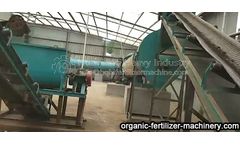Dairy And Grain Farms Via Manure Articles & Analysis
20 articles found
A 10’ x 60’ (3m x 18m) BioReactor was installed 2009 at a 1700 cow dairy farm. The BioReactor is composting dewatered dairy manure. The retention time is 4 days and there is no stabilization period. The compost is used for bedding the herd and soil restoration. ...
Dairy farming is not only a crucial part of our food industry but also a significant contributor to agriculture's environmental challenges. Managing dairy waste, especially manure, is a pressing issue that has wide-reaching implications for both the farming community and the environment. In this blog post, we will delve into the importance of manure management in dairy farms and explore the ...
The Inland Empire Regional Composting Facility (IERCF) was constructed under a Joint Powers Authority agreement between the Inland Empire Utilities Agency and the LA County Sanitation Districts to manufacture exceptional quality compost that is good: for soil, plants, the environment, and public health. The in-vessel, 150,000 ton per year co-composting facility processes a blend of green ...
Now we can see that many dairy farms, chicken farms and other farms are going to buy organic fertilizer equipment. Why? First of all, because the organic fertilizer production equipment can treat the manure of livestock and poultry into organic fertilizer, which fundamentally solves the pollution caused by the manure of livestock and poultry, so that the environmental problems in the farm can be ...
The objective of this study was to determine the effectiveness of anaerobic digestion in the treatment of polyphenols (PP) present in olive mill wastewater (OMW) and wine distillery wastewater (WDW). Anaerobic Toxicity Assay (ATA) was conducted to assess the impact of the most representative phenolic compounds present in OMW and WDW: catechol, tannins and p-Coumaric acid, on biogas production. ...
Received for publication November 7, 2008. We tested the efficacy of matrix-based fertilizers (MBFs) to reduce Escherichia coli and Enterococcus spp., NH4, NO3, dissolved reactive phosphorus (DRP), and total phosphorus (TP) in leachate and soil after dairy manure application in greenhouse column studies. The MBFs are composed of inorganic N and P in compounds that are relatively loosely bound ...
Received for publication February 13, 2009. Ammonia is an important air and water pollutant, but the spatial variation in its concentrations presents technical difficulties in accurate determination of ammonia emissions from animal feeding operations. The objectives of this study were to investigate the relationship between ammonia volatilization and 15N of dairy manure and the feasibility of ...
The contribution of organic wastes to crop yields and soil fertility may be influenced by their composition and the soil type. This 6-yr study (2001–2006) evaluated the effects of repeated additions of mineral fertilizers (MF), mixed paper mill sludges (PMS) (18, 36, and 54 Mg ha–1), dairy cattle manure (DCM) (36 Mg ha–1) alone or with reduced mineral fertilizer (60% NPK) (RMF) and a control, on ...
Precise feeding of protein and mineral supplement can maintain high levels of milk production and reduce nutrient excretion in dairy manure and losses to the environment. No information is available on the impacts of feeding different silages to dairy cattle (Bos taurus) on manure N cycling in soils. Slurry from dairy cattle fed rations containing alfalfa (Medicago sativa L.; ALF), red clover ...
Due to a lack of surface residue and organic matter inputs, continuous corn (Zea mays L.) silage production is one of the most demanding cropping systems imposed on our soil resources. In this study, our objective was to determine if using cover/companion crops and/or applying low-solids liquid dairy manure could improve physical, chemical, and biological soil properties and overall soil quality. ...
Received for publication February 14, 2008. To control ammonia (NH3) volatilization from the dairy cattle (Bos taurus) manure composting process, a compost pile was covered with mature compost and the gas emissions evaluated using the dynamic chamber system. The peak of NH3 volatilization observed immediately after piling up of the compost was reduced from 196 to 62 mg/m3 by covering the compost ...
Received for publication December 27, 2007. Many states have adopted a P site index (PSI) as a risk assessment tool to determine when P-based nutrient management is required for a given agricultural field. Some PSIs use a weighting factor, the phosphorus source coefficient (PSC), to account for differences in P solubility between organic P sources. Information relating to appropriate values of ...
Managing heavily manured soils for decreased P loss to waters requires improved understanding of the chemical and sorption–desorption characteristics of P in these soils. We used soils from agricultural fields receiving 8 yr of dairy, poultry, swine manure or spent mushroom compost for the determination of P functional groups in NaOH-EDTA extracts by solution 31P nuclear magnetic resonance (NMR) ...
With the highest cattle density in northeastern Wisconsin and urban sprawl sprawling, Brown County has accelerated its investigation into how to handle growing amounts of dairy manure and industrial wastes spread on a diminishing land base.Applying waste on limited crop acreage has led to groundwater contamination issues and pollution problems of lower Green Bay.The solution lies in a value-added ...
Surface-applied dairy manure can increase P concentrations in runoff, which may contribute to eutrophication of lakes and streams. The amount of dietary P fed to dairy cows (Bos taurus) and the timing of a rain event after manure application may further affect runoff P losses. The objective of this study was to examine dietary P supplementation effects on manure and runoff P concentrations from ...
Mineral fertilizer alone may not sustain soil productivity in cropping systems that return little crop residues to the soil, unless additional organic residues and/or manure is applied regularly to the soil. The objective of the present study was to assess the long-term effects of mineral fertilization (No fertilizer, PK, and NPK) and manure addition (0 and 20 Mg ha–1 yr–1) on soil physical and ...
One relatively under-used manure management strategy employed by dairy farmers is to transport and apply manure onto the fields of nearby grain farmers. While this system offers advantages to both parties, little of the existing research on manure management has been conducted on grain farms. As part of an effort to link grain and livestock farms in southern Wisconsin, 20 on-farm trials were ...
Accumulation of dairy manure compost has created a need to identify alternative uses for this plant nutrient source. This field study determined compost effects on corn (Zea mays L.) silage production, nutritive value, and soil characteristics for three growing seasons following incorporation of dairy manure compost at 0, 35, 70, and 105 Mg dry matter (DM) ha–1. Yields from subplots receiving ...
Nitrogen mineralization and immobilization following manure application are critical processes influencing plant N supply and offsite N losses. We conducted laboratory experiments to examine the influence of these two processes in addition to N oxide gas production on N availability for 180 d following manure addition. A Tara loam (fine-silty, mixed, superactive, frigid Aquic Hapludoll) and a ...
Composting is a successful method of recycling organic waste materials such as yard trimmings, municipal biosolids, animal manure and organic urban wastes into stabilised materials that could be used for bioremediation, erosion control, landscaping, and roadside vegetation. The process of organic wastes composting is expanding rapidly in the USA and other countries since landfill spaces for ...








